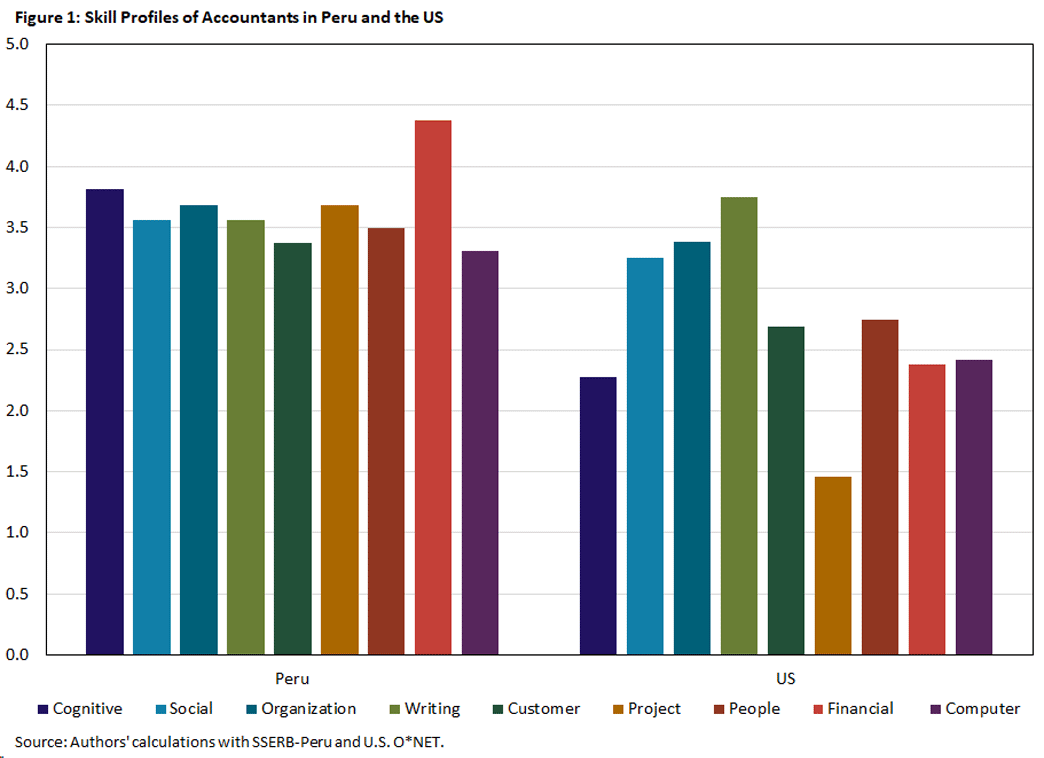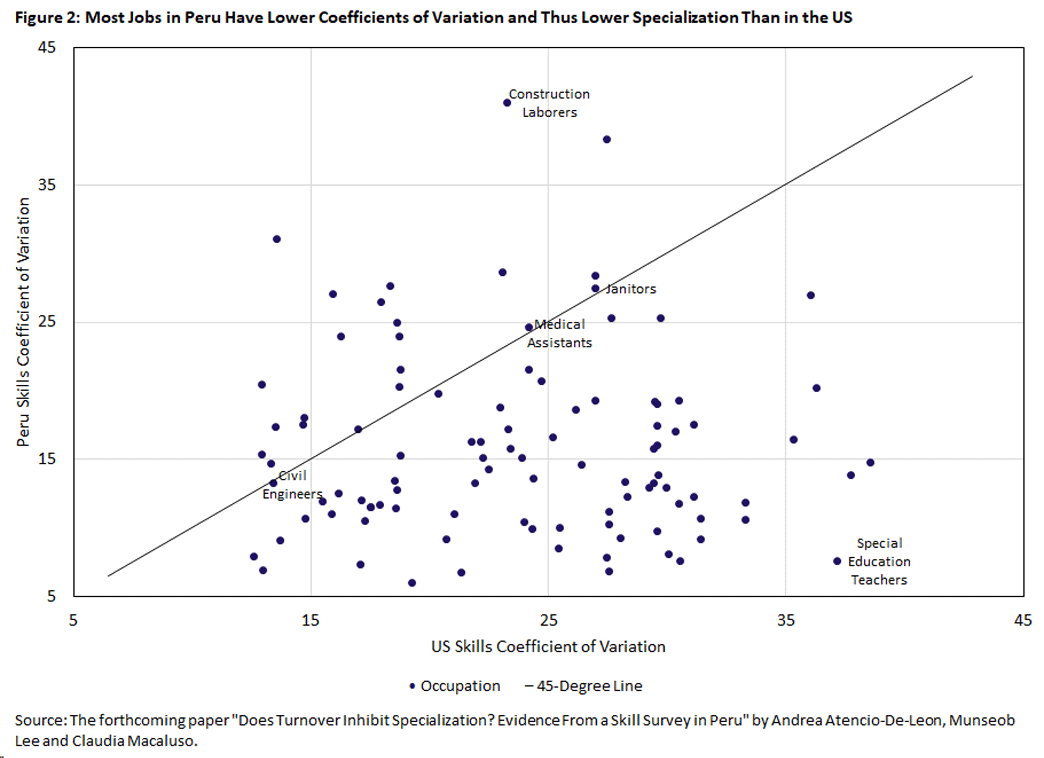Understanding the Lack of Skill Specialization in Peru
Reprinted with permission from VoxDev: “Understanding the Lack of Skill Specialisation in Peru.”
Jobs in Peru use a larger number of skills than comparable jobs in the U.S. This lack of specialization is consistent with firms’ hiring of "toderos" (workers with many skills, do-it-alls), given the high levels of worker reallocation.
Labor markets in poorer countries are characterized by higher worker reallocation rates.1 In richer economies, a dynamic labor market that seamlessly reallocates workers to jobs goes hand in hand with robust productivity growth and sustained income growth.2 Instead, in poorer countries, the brisk pace of reallocation is accompanied by high unemployment and under-employment risk and lower returns to human capital.3
In our research, we explore why fast-reallocating labor markets do not yield productivity enhancements.4 To do so, we use detailed microdata to provide new evidence on disparities in detailed job skills between a rich and a poorer country. While a preference for workers who are generalists is a response to an economic environment with a high turnover rate, the lack of specialization limits productivity growth.
Survey of Skills and Employers Recruiting Behavior (SSERB) in Peru
In the U.S., the O*NET skill survey provides detailed information on the average importance and level of large set cognitive and non-cognitive skills, as reported by workers, managers, and occupational experts for each occupation. On the other hand, there are no data sources to study the skill content of jobs in poor countries. To remedy the dearth of data, we therefore conducted a similar survey with a nationally representative sample of workers and firms in urban Peru. Managers were asked to reflect on the performance of a specific employee’s occupational tasks and report the importance of nine skills (cognitive, social, organization, writing, customer service, project management, people management, financial skills, and computer skills) on a 1-5 scale (just like the O*NET).
Workers in Peru Are Less Specialized Than in the U.S.
We compare occupational skill profiles in Peru and the U.S., and find that occupational skill profiles are substantially flatter in Peru — different professional figures do “a little bit of everything” instead of specializing in a limited set of core tasks. As an illustration, Figure 1 below compares the average importance of skills for one such occupation, accountants, across the two countries. In the U.S., accountants specialize in organization and writing skills, but not so much in project management or cognitive problem-solving skills. Instead, in Peru accountants attribute more importance to every skill, including those that were less important for U.S. accountants — hence the flatter skill profile.
In our research, we formally measure this in several ways and conclude that we find similar patterns in most occupations. Figure 2 below depicts this fact. Each point in the scatter plot corresponds to an occupation average “coefficient of variation” (CV), which illustrates a variable’s degree of dispersion around the mean: with little dispersion, the coefficient is close to zero and the mean is a very good guess for any of the variable’s values. A higher CV represents a more specialized skill profile: when some skills are unimportant (value of 1) and other skills are extremely important (value of 5), a mean of 2.5 will be a poor predictor of either. On the other hand, flat, unspecialized skill profiles have the opposite characterization: if all skills are somewhat important or important (a value of 2 or 3), a guess of 2.5 is much better a prediction than in the specialized case.
Thus, the fact that occupational coefficients of variation are smaller in Peru reinforces the idea that Peruvian occupations are performed without skill specialization. Or, in the words of Eduardo Galeano, Peruvian workers are toderos: “In Caracas, they are called toderos (do-it-alls), because they indeed do everything ; these marginalized workers live on occasional jobs, nibbling work bit by bit: they are servers or servants, stone-cutters or occasional masons, salespeople or street vendors, occasional electricians or plumbers or wall painters or car attendants; simply labor, available for whatever comes.”5 While the term toderos refers not only to marginalized workers nowadays, Galeano’s reference highlights its main meaning: the versatility of Latin American workers –for which we find evidence in our paper.
Does Skill Flattening Come From Inefficient Hiring Practices?
A lack of specialization may come from inefficient hiring technology, yielding fewer and poorer matches between employers and employees than the same resources would produce in the U.S. To investigate this hypothesis we develop a survey of hiring methods and yields, which we fielded both in Peru and the U.S.6 We do not find evidence of inefficient hiring in Peru. Open jobs fill quickly, with an average vacancy duration of 9.1 days, and only 10% (1%) of vacancies remain unfilled after two weeks (four months). We also find very little appreciable difference in recruiting methods between Peru and the U.S. Our data confirms that the Peruvian labor market is fluid and that hiring procedures, unlike managerial ones as documented by Nicholas Bloom and John Van Reenen in 2007, are not especially unproductive.7
The Uncertainty of Labor Availability Explains Firms’ Hiring of Unspecialized Workers
Production tasks are often complementary. Michael Kremer in 1993 proposed the “O-ring theory,” where production tasks must be executed proficiently together for any of them to be of value.8 The name is a reference to the 1986 Challenger shuttle disaster; it exploded because it was launched at a temperature that caused one of those components, the O-rings, to malfunction. O-rings are small, mechanical gaskets, a seemingly insignificant part of a space shuttle. Yet, their malfunction led to disaster. Similarly, the O-ring theory of production postulates that output can be manufactured only if all inputs (in this case, skills) are present. As an illustration, one can think of the skills needed to turn on the light in a manufacturing establishment. Mastery of any specific task on the production line is of little use if workers and equipment lies in the dark!
When there is this type of complementarity in production tasks, high worker reallocation rates mean production losses. Employers are seldom sure what available labor they might find as they open their shops or come to the factory floor on any specific date, as idiosyncratic shocks affect workers and their access to transportation, child or elderly care, or their willingness or ability to work for pay. Thus, employers value workers who can perform many tasks to minimize disruptions to production. In the terms of our previous example, when employees are often absent or churn across jobs, employers need all employees to have the skills to turn on the factory floor lights — then, it doesn’t matter if someone is missing for production to happen.
In our research, we propose a stylized model that delivers a crucial insight consistent with this intuition: hiring generalists (“toderos”) becomes more profitable when the separation rate is high.
Conclusion: High Turnover Can Inhibit Specialization
We document that jobs in Peru use a larger number of skills than comparable jobs in the U.S. The lack of specialization is consistent with an environment in which skills are complementary in production and a fast-paced labor market, with frequent separations and hires, causing a preference for toderos (workers with many skills, do-it-alls). Together with evidence from the literature, we find evidence that this is the case.9 We conclude that a brisk pace of job reallocation has the potential to significantly inhibit occupational skill specialization, as we show is the case in Peru, potentially contributing to human capital and productivity deficits.
Andrea Atencio De Leon is an economist in the Strategy and Policy Review Department at the International Monetary Fund. Munseob Lee is an assistant professor at the University of California San Diego. Claudia Macaluso is an economist in the Research Department at the Federal Reserve Bank of Richmond.
See the 2023 paper “Labor Market Dynamics and Development” by Kevin Donovan, Will Jianyu Lu and Todd Schollman.
See the 1993 paper “Job Turnover and Policy Evaluation: A General Equilibrium Analysis” by Hugo Hopenhayn and Richard Rogerson; the 2001 book chapter “Aggregate Productivity Growth: Lessons From Microeconomic Evidence” by Lucia Foster, John Haltiwanger and C.J. Krizan; and the 2014 working paper “Labor Market Fluidity and Economic Performance” by Steven Davis and John Haltiwanger.
See the 2024 paper “Unemployment and Development” by Ying Feng, David Lagakos and James Rauch and the 2018 paper “Life Cycle Wage Growth Across Countries” by David Lagakos, Benjamin Moll, Tommaso Porzio, Nancy Qian and Todd Schollman.
See our forthcoming paper “Does Turnover Inhibit Specialization? Evidence From a Skill Survey in Peru.”
See the 1971 book Las Venas Abiertas de America Latina by Eduardo Galeano.
See the 2021 article “How Do Employers Recruit New Workers?” by Steven Davis, Claudia Macaluso and Sonya Ravindranath Waddell.
See Bloom and Van Reenen’s 2007 paper “Measuring and Explaining Management Practices Across Firms and Countries.”
See Kremer’s 1993 paper “The O-Ring Theory of Economic Development.”
See the aforementioned 2023 paper “Labor Market Dynamics and Development.”
To cite this Economic Brief, please use the following format: Atencio De Leon, Andrea; Lee, Munseob; and Macaluso, Claudia. (August 2024) "Understanding the Lack of Skill Specialization in Peru." Federal Reserve Bank of Richmond Economic Brief, No. 24-29.
This article may be photocopied or reprinted in its entirety. Please credit the authors, source, and the Federal Reserve Bank of Richmond and include the italicized statement below.
Views expressed in this article are those of the authors and not necessarily those of the Federal Reserve Bank of Richmond or the Federal Reserve System.
Receive a notification when Economic Brief is posted online.



